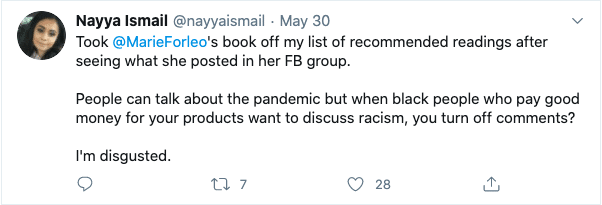“I take full and complete responsibility for my mistake. I was 100% wrong.”
Marie Forleo
Marie Forleo didn’t see the backlash coming. The entrepreneur and best-selling author has built a brand that rivals some of the biggest influencers in business and personal development.
But she (and her reputation) ran into trouble recently when members of her B-School Facebook group didn’t take too kindly to being asked not to discuss topics related to racism and white privilege.
The backlash was swift…







The message was loud and clear. But the lessons that you and I can learn as business owners may not be so obvious.
The Dangers of Social Media and Doing Business in the Public Eye
Social media is the place for today’s businesses to connect with clients and customers. It’s a direct line of communication that businesses never had until the Internet came along.
Now, small and large businesses are using social media to build trust and increase visibility for their brands.
But having an online presence has its risks.
No matter what you do and how hard you try…you’re never going to make everyone happy all the time.
Clients, customers, and followers may vent their frustrations on social media, which can hurt your brand’s reputation.
Forleo and others like her who’ve faced backlash online can do the right thing by responding openly, honestly, and humbly.
When you run a business with an online presence, you have to learn how to protect the reputation of you and your business.
How to Protect Your Online Reputation
Don’t let the threat of negative feedback (or worse) scare you from putting yourself out there.
Here are six business reputations we can learn to reduce the risk of online backlash while protecting the integrity of your brand.
1. Always Deliver Top-Notch Value and Service
Sometimes negative feedback is the result of bad service. If you take care of your clients while always exceeding their expectations, you avoid upsetting them when something goes wrong.
Respond to clients quickly and address their concerns immediately. Failing to respond to negative reviews in the right way can cost your reputation and sales.
Everyone makes mistakes, and clients who know that you try your hardest to keep them happy are more likely to forgive you when you lose sight of their needs.
2. Establish and Manage Your Online Presence
When someone searches your name or business, what do they find?
Your website, social media, and YouTube channel promote your services and products. But they have a second purpose that’s just as important: They establish your online presence.
Make sure you have well-crafted profile pages on public platforms, and update your profiles at least once a year to reflect changes in your business or skill set.
A blog can help you rank highly in the search results. Publish content consistently so that the public sees the best representation of you, your business, and your brand.
Use Google Alerts to trigger notifications that show you when something is posted online about your business. Set up alerts for your name and your business so that you can monitor their web presence over time.
3. Don’t Ignore or Delete Negative Comments
Ignoring negative comments will only hurt you and your business. The public might see you as unresponsive and uncaring.
Deleting someone’s negative feedback can cause them to push back harder. They may take their grievances elsewhere, doing further damage to your brand’s reputation.
If they have a large following, the backlash could grow quickly.
Internet users don’t always take negative reviews at face value, especially if complaints are the exception to the norm. Always acknowledge negative comments.
4. Humanize Your Business
Many businesses and public figures have responded to backlash through statements written by their legal or public relations team.
But these generic statements make it seem like you’re hiding behind your business. The best response is to show your human side.
Step out from behind the legalese and speak as you would to the person if you were face-to-face.
Speak directly to the person. Mention their name and make sure they know they’ve been heard. In most cases, people who lash out at businesses just want someone to acknowledge their needs.
If you can’t address their needs, direct them to the person who can. Let them know that you’ll start the process of making things right ASAP.
5. Always Be Professional
Things can get heated online. But don’t let your emotions get the best of you.
Take time to think about what’s been said and how you can respond. Remaining professional online is your best bet against altercations that can hurt your reputation.
Respond quickly, but give yourself time to explain your side of the story. Think about what position you’re going to take and how that might escalate or deescalate the situation.
Taking the conversation offline is always a good idea. Offer to speak with the person directly over the phone or via email.
Not only does this take the conflict out of the public arena, but it also gives the person your full and undivided attention.
6. Make Things Right Again
When you focus on how you can make things right again for your clients, your brand’s reputation can come out unscathed (and maybe even better off).
When the public sees that you’ve made an honest effort to make things right again, you strengthen the integrity and credibility of your business.
Your clients want to see you succeed. They’re not out to get you when they criticize or condemn you for some perceived wrongdoing.
Unsatisfied clients are part of doing business. And the more clients you serve, the higher the risk that you’ll have someone push back because they don’t like something you’ve said or done.
Be solution-oriented…not conflict-oriented. Don’t take negative feedback personally. Learn to listen to others, sympathize with their feelings, and recognize their needs.
When you can do those things, you strengthen your position in the online marketplace. And your audience will thank you for it.



+ Show Comments
- Hide Comments
Add a Comment